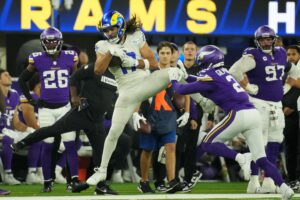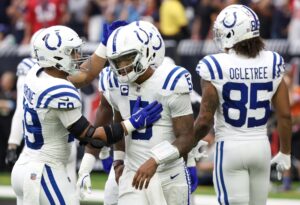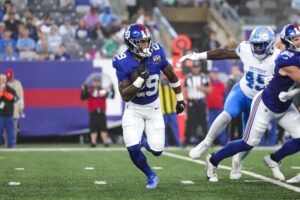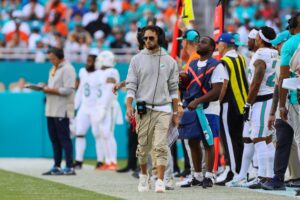Super Bowl Sunday has captivated the attention of America for the past half-century. But for the first 30 seasons, the games were mostly lopsided. In fact, only seven of those games were decided by seven or fewer points. It’s actually a little surprising that the game has become a national spectacle despite early snooze-fests.
Fortunately, since John Elway and the Denver Broncos defeated the Green Bay Packers in Super Bowl XXXII by a score of 31-24, the games have typically been more hotly contested. Including the Broncos victory, out of the past 22 Super Bowls, 13 of them have been decided by one score. And of those 13, six have come in the past decade. We’ve witnessed the lights going out at the Superdome, a dynasty being reborn, and the greatest comeback in the history of the big game during that span.
So with Super Bowl LIV just a few days away, let’s rank the ten games and reflect on some of the big moments and players.
Ranking the Super Bowls of the 2010s
10. Super Bowl XLVIII, Seattle Seahawks 43, Denver Broncos 8
For Seattle fans, this might be one of the greatest days of their lives. But for the rest of America, Super Bowl XLVIII became a snooze-fest when the Seattle Seahawks and the “Legion of Boom” flexed their muscles and dismantled Peyton Manning and the high-flying Broncos. Things got ugly on the opening snap when a poor shotgun snap caught Manning off guard and was recovered by the Broncos in the endzone for a safety. Late in the first half, down 15-0, Manning was hit as he threw and the game’s MVP Malcolm Smith intercepted the pass and ran it back 69 yards for a touchdown.
The game appeared over with the Seahawks and their top-ranked defense holding a 22-0 lead at halftime, and an 88-yard kickoff return touchdown to open the second half by Percy Harvin slammed the door shut on any hopes of a Broncos comeback. The win would give the Seahawks their first and only Super Bowl championship in franchise history (more on that later).
9. Super Bowl LIII, New England Patriots 13, Los Angeles Rams 3
Last year’s Super Bowl was blasted for being another snooze-fest, but at least the outcome was in question going into the fourth quarter. The Los Angeles Rams, who had the league’s second-ranked offense during the regular season, were shut out in the first half. With the score tied 3-3 heading into the fourth quarter, the New England Patriots showed why they are the greatest dynasty in league history. Tom Brady connected with Rob Gronkowski on a 29-yard pass to set the Patriots up at the 2-yard line. One play later, running back Sony Michel ran in for a touchdown. Rams quarterback Jared Goff threw an interception on the ensuing drive, and a Stephen Gostkowski field goal sealed the Patriots’ sixth Super Bowl win.
8. Super Bowl 50, Denver Broncos 24, Carolina Panthers 10
The 2015 version of the Broncos was much different than the 2013 version that was crushed by the Seahawks. Peyton Manning was a shell of his former self, but a dominant Broncos defense carried the team all the way to the Super Bowl. On the other side, the Carolina Panthers entered with the league’s MVP, Cam Newton. They had lost just once all season and rolled through the playoffs (save for a late rally by the Seahawks in the Divisional Round).
Despite having the MVP, the Panthers offense was never able to get rolling. Linebacker Von Miller led a ferocious pass rush that got to Newton six times, including a strip-sack that resulted in the game’s first touchdown. Miller would win the game MVP with 2.5 sacks and two forced fumbles in all. His bookend pass-rusher, DeMarcus Ware, added two more sacks as the Broncos abused the Carolina offensive line.
Still, the Panthers defense did all that they could to stay in the game. With five sacks of their own, they held the Broncos to only 194 total yards. Had they won, defensive end Kony Ealy certainly would have won MVP, as he led the way with three sacks and an interception.
The game was a defensive struggle throughout, and with the Broncos leading 16-10 with just over four minutes remaining, Miller forced his second fumble as T.J. Ward recovered the ball at the Panthers’ four-yard line. Three plays later, and a two-point conversion to add on, and the Broncos sealed the game. This was far from a bad Super Bowl, but it lacked the signature plays that will make it memorable to the casual fan in ten years.
7. Super Bowl XLV, Green Bay Packers 31, Pittsburgh Steelers 25
An underrated Super Bowl, XLV was a chance for the Pittsburgh Steelers to claim their seventh Lombardi Trophy. Things got ugly fast though as the Packers kicked off the scoring when Aaron Rodgers found Jordy Nelson on a 29-yard touchdown strike. On the first play of the ensuing drive, Ben Roethlisberger threw a pass right to Packers safety Nick Collins who ran the interception back 37 yards for a touchdown. Things didn’t get much better for the Steelers as Rodgers found Greg Jennings on a 21-yard touchdown pass with just over two minutes to go in the first half. The Packers had a comfortable 21-3 lead.
Then things changed as the Steelers scored touchdowns to end the first half and to begin the second half. The lead was cut to 21-17 in under six minutes of game-time. With the Packers on their heels, the Steelers had the ball on the Green Bay 33-yard line. But Packers linebacker Clay Matthews made the play of the night, forcing Steelers running back Rashard Mendenhall to fumble. The Packers recovered and capitalized eight plays later when Rodgers once again found Jennings in the endzone to take a 28-17 lead.
The Steelers answered with a Mike Wallace touchdown and a two-point conversion, but the Packers were able to get a field goal on the next drive to push the lead to 31-25. Roethlisberger and the Steelers came up short on the potential game-winning drive, and the Packers became the second six-seed to win a Super Bowl.
6. Super Bowl XLVI, New York Giants 21, New England Patriots 17
The rematch of Super Bowl XLII once again featured an up-and-down New York Giants team, and just like in their magical 2007 season, they played the role of spoiler in the playoffs after finishing the season 9-7. Meanwhile, the Patriots had survived an AFC Championship Game that they should have lost against the Baltimore Ravens and weren’t the juggernaut that they were in 2007. There was no reason for the Giants to feel intimidated as they knew that they had the Patriots’ number.
This game, however, didn’t have the drama of a perfect season on the line. Still, Giants quarterback Eli Manning connected with breakout receiver Victor Cruz late in the first quarter to push the Giants’ lead to 9-0. After that, though, the Patriots rallied off 17 unanswered points, including touchdowns to end the first half and to begin the second half. With a 17-9 lead, the Patriots had seized momentum.
Like they had done four years earlier, though, the Giants fought back. After kicking two field goals and cutting the deficit to 17-15, the Giants got the ball back at their own 12-yard line with 3:46 left to play. On first down, Manning brought back memories of the “Helmet Catch” when he threw a strike down the left sideline to receiver Mario Manningham for a 38-yard gain who braced for contact while keeping his feet in-bounds. With the field cut in half, Manning continued to feed Manningham and Hakeem Nicks as the Giants got to the Patriots’ 6-yard line. Two plays later, running back Ahmad Bradshaw ran in for the most anti-climatic go-ahead touchdown run in Super Bowl history. Bradshaw and the Giants wanted to run the clock and force the Patriots to use timeouts to set up a game-winning field goal, but New England wisely allowed the touchdown to preserve time to at least give themselves a chance to come back with just under a minute left.
A potential game-winning drive fell short as Brady heaved a Hail Mary pass up to Rob Gronkowski that fell incomplete. It was the second time in five seasons that the Patriots had a Super Bowl victory snatched out of their hands. And, for the sake of this list, the game-winning drive pushed this game past Super Bowl XLV.
5. Super Bowl XLIV, New Orleans Saints 31, Indianapolis Colts 17
Perhaps no Super Bowl has done more for a region than Super Bowl XLIV did for New Orleans. Four years after Hurricane Katrina had ravaged the area, the New Orleans Saints were playing in their first Super Bowl in team history. On the other side, the Indianapolis Colts and Peyton Manning were seeking their second Super Bowl victory in four seasons. The Colts jumped out to an early 10-0 lead following a 19-yard touchdown pass from Manning to Pierre Garcon. The Saints, ahem, marched back with two field goals, including one to end the half. Like the previous two Super Bowls on this list, the Saints took advantage of scoring on each side of halftime.
This game, however, was different in that the Saints were set to kick off to the Colts to begin the second half. Head coach Sean Payton called for a surprise onside kick and the Saints recovered, swinging momentum completely in their favor following the elongated halftime show. Six plays and 58 yards later, Drew Brees found running back Pierre Thomas for a 16-yard touchdown pass that put New Orleans up 13-10. The Colts responded with a 10-play, 76-yard touchdown drive of their own to reclaim the lead, 17-13. It would be the last time that Indianapolis would score, though, as the Saints added a Garrett Hartley field goal. In the fourth quarter, Brees found tight end, Jeremy Shockey, for a two-yard touchdown that was capped with a successful two-point conversion with 5:42 remaining in the game.
With the Saints leading 24-17, the game was in the hands of Manning. After driving to the Saints 31-yard line, though, Manning was intercepted by NFC Championship Game hero Tracy Porter who raced 74 yards the other direction to seal the game with a touchdown. It was the only Super Bowl appearance for Brees, who won game MVP.
4. Super Bowl XLVII, Baltimore Ravens 34, San Fransisco 49ers 31
Not many players have benefited more from a Super Bowl than Joe Flacco. The former Baltimore Ravens quarterback had one of the greatest postseason runs of all-time prior to Super Bowl XLVII, and in the game, he continued his hot streak. The scoring got going early as Flacco found Anquan Boldin on Baltimore’s first possession. Flacco added two more touchdowns in the half, including a spectacular 56-yard pass to Jacoby Jones with 1:45 to go in the first half to push the Ravens’ lead to 21-3.
After the 49ers kicked a field goal to end the first half, Jones set a Super Bowl record with a 108-yard kickoff return for a touchdown that appeared to set up a rout. However, the lights in the Superdome caused a 35-minute delay in game-time and halted all of the momentum that the Ravens had following the touchdown. When play resumed, San Fransisco 49ers quarterback Colin Kaepernick and the offense got hot. After finding Michael Crabtree for a 31-yard touchdown, the 49ers stopped the Ravens. Following a big punt return by Ted Ginn Jr., San Fransisco found the endzone again when Frank Gore rumbled in from six yards out. Two plays into the next Ravens drive, running back Ray Rice fumbled and the 49ers kicked a field goal to trim the lead to 28-23.
Baltimore kicked a field goal to get the scoring going in the fourth quarter, but it was still a one-score game at 31-23. Kaepernick answered with the longest rushing touchdown by a quarterback in Super Bowl history of 15 yards. Down 31-29, Kaepernick missed on a two-point conversion attempt to Randy Moss. The Ravens again answered with a field goal but chewed 5:38 off of the clock to push the lead to 34-29. Following a 33-yard run by Gore, San Fransisco had the ball at the Ravens seven-yard line with a chance to pull off the biggest comeback in Super Bowl history. But after gaining just two yards on the first three downs, the 49ers went for the endzone on fourth down. A pass to Crabtree fell out of reach, and many questioned why a pass interference or defensive holding was not called. The Ravens would take an intentional safety with four seconds left in the game before stopping Ginn on the ensuing free-kick to win their second Super Bowl in franchise history.
3. Super Bowl LII, Philadelphia Eagles 41, New England Patriots 33
No game in NFL history has produced more yards than Super Bowl LII between the Patriots and Philadelphia Eagles. With 1,151 yards by both offenses, this game didn’t lack fireworks. Eagles quarterback Nick Foles picked up where he had left off on his own great postseason run, winning MVP honors after throwing for 373 yards, three touchdown passes, and being on the receiving end of the “Philly Special” right before halftime. The play was not only creative; it was gutsy. The Eagles were up 15-12 while facing fourth down. A field goal would have kept the game within a touchdown. A missed fourth-down conversion, however, would have given New England all of the momentum heading into halftime. Instead, it worked and the Eagles took a 22-12 lead heading into the break.
Tom Brady had his own particularly great game as well despite the losing effort. He set the Super Bowl record with 505 passing yards and three touchdowns. In the second half, he hit Rob Gronkowski for touchdowns twice as the Patriots erased the 10-point deficit on the second grab and took a 33-32 lead. Once again, though, the Eagles answered as Foles led a 14-play, seven-minute drive that ended when he found tight end Zach Ertz on an 11-yard go-ahead touchdown pass to push the lead to 38-33. Still, with 2:21 left and the ball in Brady’s hands, everyone held their breath as they waited to see if the greatest quarterback ever would answer. Instead, Eagles defensive end Brandon Graham strip-sacked Brady for the only sack of the game for either team. The Eagles would kick a field goal, and once again the Patriots were left with too little time as a Hail Mary to Gronkowski fell short.
2. Super Bowl XLIX, New England Patriots 28, Seattle Seahawks 24
This is the toughest decision on the list. If we rank the Super Bowls based purely on entertainment, Super Bowl XLIX falls just short of first on the list. But if we rank based upon significance, it is probably the most important Super Bowl of the past 10 seasons. The dynasty of the 2000s, the Patriots, were seeking their first Lombardi Trophy since the 2004 season. The Seahawks, fresh off of a Super Bowl beatdown over the Broncos a year prior, were looking to become the first team to repeat as Super Bowl champions since the Patriots in 2003-04. A passing of the torch was possible if the Seahawks could pull this game out.
The Patriots kicked off the scoring when Brady found Brandon LaFell for an 11-yard touchdown in the second quarter. The low-scoring game wasn’t a huge surprise as the Seahawks once again boasted the league’s best defense. But when Seahawks running back Marshawn Lynch ran in a touchdown with 2:16 left in the first half, the fireworks began for one of the wackiest Super Bowls ever. With 31 seconds to go in the half, Brady found Gronkowski for a 22-yard touchdown pass that put the Patriots up 14-7. Seattle answered with their own quick-strike as Russell Wilson hooked up with Chris Matthews for an 11-yard touchdown with two seconds remaining in the first half to tie the game.
Seattle then took advantage like many others on this list by scoring immediately after halftime with a field goal to take a 17-14 lead. Later in the third quarter, Wilson found Doug Baldwin to stretch the lead to 24-14. It appeared that the Seahawks were on their way to their second straight Super Bowl win as they took the lead into the fourth quarter. The Patriots began to click, though. After nine plays and 68 yards, Brady found Danny Amendola for a four-yard connection to cut the lead to four. Seattle went three-and-out on the ensuing drive, and Brady once again marched the Patriots downfield with an 11-play drive. When he found Julian Edelman for a three-yard score, the Patriots had erased what appeared to be an insurmountable lead against the best defense in modern NFL history.
Down 28-24, the Seahawks still had 2:02 left on the clock to come back. Wilson hit Lynch for 31 yards before the two-minute warning and the Seahawks were in business. Four plays later, Wilson heaved a pass down the right sideline. Jermaine Kearse made one of the greatest catches in Super Bowl history as he somehow came down with the ball, setting the Seahawks up at the Patriots 5-yard line with 1:06 left to play. One play later, Lynch punched the ball down to the 1-yard line, and the Patriots were on their heels. With 26 seconds left, Wilson dropped back to pass and appeared to have Ricardo Lockette wide-open for the game-winning touchdown. However, Patriots cornerback Malcolm Butler read the play, drove on the pass, and intercepted the ball to end the game and give the Patriots their fourth Super Bowl win.
The decision to pass instead of handing the ball to Lynch drove a wedge inside the Seahawks locker room. The core of the team slowly fall apart and Seattle hasn’t even reached the NFC Title Game since 2014. The Patriots, meanwhile, have won two additional Super Bowls and have continued to dominate the NFL. Had the Seahawks won this game, the Seahawks may have been this generation’s dynasty.
Super Bowl LI, New England Patriots 34, Atlanta Falcons 28 (OT)
Possibly the greatest Super Bowl to ever be played, Super Bowl LI featured the high-flying Atlanta Falcons trying to slay the NFL’s dragon, the Patriots. The game was a feeling-out process in the first quarter, but Atlanta broke the game wide open in the second quarter. Devonta Freeman rushed in for a five-yard score to kick off the scoring, and then Matt Ryan found Austin Hooper for a 19-yard score to put the Falcons up 14-0. The Patriots then began marching down the field seeking their first score of the game, but on the 12th play of the game, Brady was intercepted by Robert Alford who raced 82 yards for a touchdown. The Patriots responded with a field goal before the half, but the Falcons held a 21-3 lead without touching the ball on offense the final 8:48 of the first half.
The second half didn’t get any better for the Patriots as the Falcons scored on their second drive when Ryan found Tevin Coleman for a six-yard touchdown pass. At 28-3, the game appeared to be over. Even after the Patriots responded with their own touchdown drive, Gostkowski missed the extra point and the Falcons still led 28-9. After another Patriots field goal, it appeared that time was running out on any hopes of a comeback. But with 8:31 left in the game, Patriots linebacker Dont’a Hightower hit Matt Ryan on a blindside sack that forced a fumble which Alan Branch fell on. The Patriots were given new life. Five plays later, Brady hit Amendola for a touchdown before James White ran in for the successful two-point conversion. At 28-20, the Patriots had momentum.
But Atlanta, who hadn’t been on offense for much of the second half, stormed back with their own masterful drive. When Julio Jones made an insane 27-yard catch on the sideline to set the Falcons up at the Patriots 22-yard line, it appeared that they had weathered the storm and were going to seal the game up with 4:39 remaining in the game. Following a sack and offensive holding, though, the Falcons somehow pushed themselves out of field goal range and they had to punt the ball back to the Patriots.
With 3:30 left in regulation and 91 yards to go, Tom Brady showed the world why he’s the greatest quarterback to ever step on the field. What could become the biggest comeback in Super Bowl history looked like child’s play as Brady led the Patriots straight down the field. Any doubt that the Patriots wouldn’t tie the game appeared to vanish when Edelman made his own ridiculous reception on a 23-yard pass that he somehow snatched inches away from the ground. Following a challenge that was upheld on the play, the Patriots covered the final 41 yards in four plays when James White ran in for a one-yard touchdown. Atlanta still held a 28-26 lead, but Brady found Amendola on a receiver screen to tie the game.
The game went to overtime for the first time in Super Bowl history. The Falcons were reeling not only because of the 25 points they had surrendered, but also because of the amount of time they were on the field during the game had completely fatigued their defense. When the Patriots won the coin toss, they cut through the Falcons like butter. Brady was playing on a different level, and once the Patriots got to the 2-yard line, they pitched to James White who punched the ball in to cap off the largest comeback in Super Bowl history.






